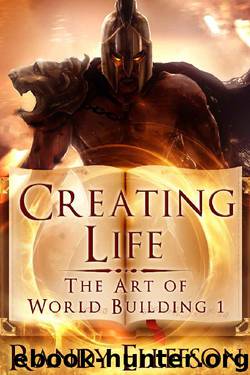Creating Life (The Art of World Building Book 1) by Randy Ellefson

Author:Randy Ellefson [Ellefson, Randy]
Language: eng
Format: epub
Tags: Non-Fiction World Building
Publisher: Evermore Press
Published: 2017-05-02T05:00:00+00:00
Science Fiction
In SF, we think of technology as being far in advance of our own on Earth, not the sort of rudiments mentioned under the fantasy section above. Is our species able to design and build machines of any kind, not to mention something far beyond current human capacity? This requires intelligence, education and infrastructure for mining, refinement, chemistry, and more. Do we envision that they’re chemists, engineers, and physicists? If not, they must steal everything, with it being more likely that they’ll steal an entire ship, for example, rather than the parts to assemble one; this would be true of most if not all other technologies.
Can we assume that some of these intellectual capacities and skills, like engineering, are needed to operate machines? That depends on our goal. Creators often grant spaceships advanced artificial intelligence (A.I.) that takes care of many functions. This gives a less than brilliant species far more opportunities, just as a gun allows a child to kill a samurai. Do the builders of these machines account for that and require more intelligence to operate something, or biometric security? A good approach would be a mix of these styles so that we can decide, based on our story needs, which option is in effect. For example, one species could make everything easy to operate while another does not. A third species that is contemplating stealing something would take this into consideration.
Decide what their life with technology is like. An ignorant and uneducated species can enjoy life in space even if they’re not in command, because every space ship needs janitors, for example. This subservient position is something to keep in mind because it greatly broadens opportunities for them. While they might be in unenviable positions, they can still get around, and there’s the mutiny idea of such a species taking over despite their limited technological skills. Maybe they bribe ship’s officers into helping them. With some ingenuity, we can find a way to empower a weaker species.
Maybe our species steals or captures ships and is smart enough to operate but not maintain them; if something goes wrong, the crew might be stranded. Are they known for having to send out distress calls over this? It would likely get them captured and arrested, but they probably know all about this problem and travel in pairs, for example, the still-functional ship rescuing the other’s crew before everyone flees. They might also set traps, taking over a ship that comes to help them, whether they really need that help or were just setting someone up.
More advanced species will be the ones inventing technology and trying to safeguard it. They’ll be the victims of ruses by those species who can’t create these things. How has this changed or hardened/softened attitudes and laws about theft and tampering? With biometrics, devices could be set to only work with one species. We can invent all sorts of safeguards and ways of defeating them.
Not every species’ society which lacks the ability to create technology will be “evil.
Download
This site does not store any files on its server. We only index and link to content provided by other sites. Please contact the content providers to delete copyright contents if any and email us, we'll remove relevant links or contents immediately.
Asking the Right Questions: A Guide to Critical Thinking by M. Neil Browne & Stuart M. Keeley(5759)
Autoboyography by Christina Lauren(5227)
Eat That Frog! by Brian Tracy(4526)
Dialogue by Robert McKee(4389)
Sticky Fingers by Joe Hagan(4188)
Journeys Out of the Body by Robert Monroe(3615)
Annapurna by Maurice Herzog(3464)
Full Circle by Michael Palin(3443)
Schaum's Quick Guide to Writing Great Short Stories by Margaret Lucke(3374)
Elements of Style 2017 by Richard De A'Morelli(3341)
The Art of Dramatic Writing: Its Basis in the Creative Interpretation of Human Motives by Egri Lajos(3058)
Atlas Obscura by Joshua Foer(2952)
Why I Write by George Orwell(2945)
The Diviners by Libba Bray(2927)
The Fight by Norman Mailer(2927)
In Patagonia by Bruce Chatwin(2920)
The Mental Game of Writing: How to Overcome Obstacles, Stay Creative and Productive, and Free Your Mind for Success by James Scott Bell(2897)
Venice by Jan Morris(2568)
The Elements of Style by William Strunk and E. B. White(2470)
